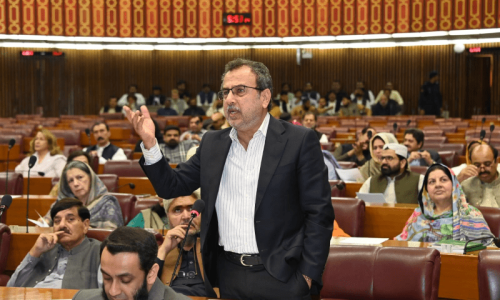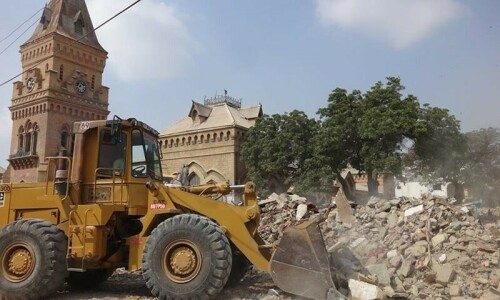KARACHI: We should still be worried. The second spike of the virus is coming. We would like parents and teachers to follow the standard operating procedures (SOPs) so that we don’t have to close down schools again. This was said by Chief Minister Sindh Syed Murad Ali Shah while answering a question put to him by S. Akbar Zaidi, executive director, Institute of Business Administration (IBA) at an event titled ‘Leadership Under Crisis: Pandemic and Civic Issues’ held on the institute’s city campus on Thursday evening.
The first thing that Mr Zaidi talked about was the praise that the Sindh government received for handling the Covid-19 crisis. Mr Shah said the crisis started on Feb 26. Before that they had a meeting of parliamentarians in which a member of the provincial assembly asked how prepared the government was to handle the pandemic. The answer was “we’re not prepared at all”.
A day later he was sitting at Bilawal House where [former] president Zardari told him that the minister for health Dr Azra wanted to talk to him [Mr Shah]. She told him about the first case of Covid-19. He called up the chief secretary for a meeting. He also had a call from the education minister asking for his permission to close down schools. His first response was “we’re not closing schools”. The chief minister said then he called up doctors, the health department, and the WHO [representatives]. He had that meeting for four to five hours, which was where he learned about the seriousness of the issue.
From that time onwards, he formed a task force and took stock of the hospitals’ situation etc. The very first decision that was taken by his government was to set up a fund. For six weeks there were meetings on a daily basis.
Mr Shah said his government imposed the first lockdown when there were only 16 coronavirus patients in the province and 26 in the country.
Chief minister warns second wave of virus may be coming
Mr Shah said only the day before (Wednesday) the highest number of suspected cases, 18,360, were tested [in Sindh] and claimed “we have tested per capita thrice the number of people tested in Pakistan … and almost 80 per cent of testing is free”. Narrowing down the reason for his government’s success in the crisis he attributed it to the policy of testing, tracing and isolating/quarantining.
Mr Shah, in reply to a question, said the 18th Amendment gave his government the freedom to do what it did when the pandemic hit the province. They had a lot of support from the doctors’ community and from the law enforcement agencies (LEAs). The first death [from the virus] took place on March 19 in the country and the first formal lockdown was announced on March 21. And within three days the other provinces followed [Sindh].
“We contacted the prime minister’s office and we are grateful to the prime minister [for listening to us].” The first countrywide lockdown on April 1 for 14 days was imposed. We were able to set up spaces for patients such as one at Nipa, so we could be a little more independent because of the 18th Amendment.
Mr Shah said there may be a second wave of the disease coming. We should be careful and not let our guard down. Unless there is a vaccine available or a cure for the virus is found. He agreed that after the loss of life, education was the biggest sufferer. “We are asking schools and parents to be more careful. We need to follow the SOPs.”
Answering a query about with the pandemic experience, how difficult it was to meet the challenges arising out of the situation such as recent torrential rains, the chief minister said, “we learn every day” and it has been a big challenge.
On the issue of local government Mr Shah said local government did a good job during the crisis and his government was trying to address the gaps in the local government act.
After the conversation, the floor was opened for the audience, which had turned up in a decent number, to ask questions.
Published in Dawn, September 25th, 2020














































